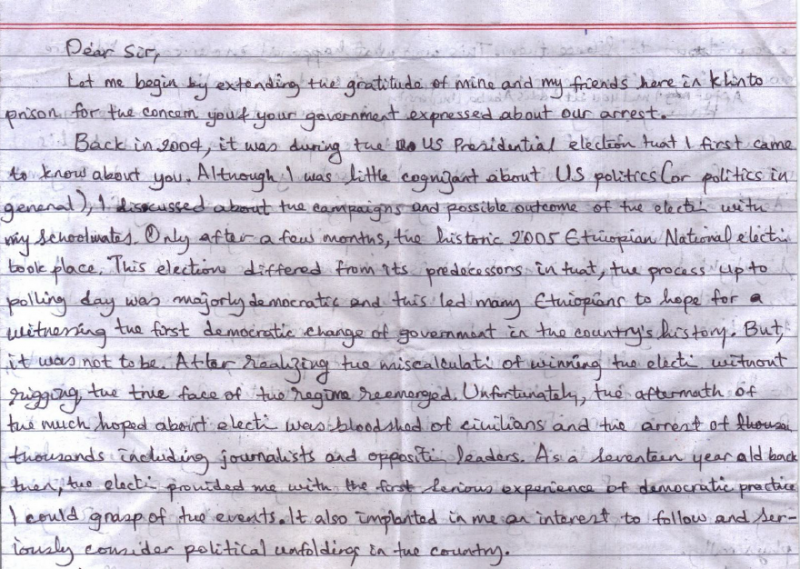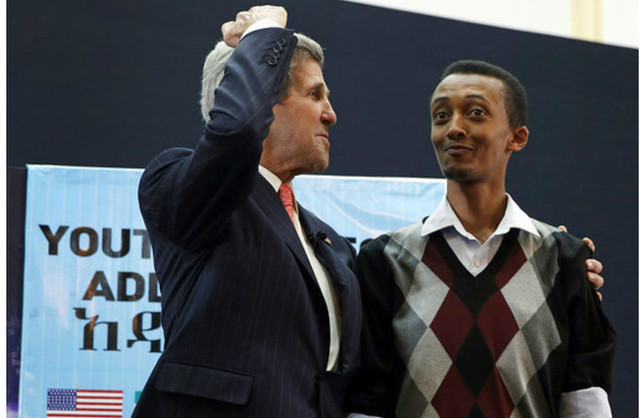
Scan of original letter from Natnael Feleke.
On April 25, 2014, nine bloggers and journalists were arrested in Ethiopia on accusations of “inciting public disorder via social media” and “receiving support from a foreign government.” The detainees had all worked with Zone9, a collective blog that covered social and political issues in Ethiopia and promoted human rights and government accountability. In July 2014, all nine detainees were charged under the country’s penal code and the Terrorism Proclamation of 2009.
The following letter, addressed to US Secretary of State John Kerry, was written by economics student Natnael Feleke, in December 2014. A founding member of the Zone9 blogging collective and a Global Voices author, Natnael has been in prison for one year.
Natnael spoke with Kerry at a public event at Addis Ababa University in 2013, where he studied before his arrest. His meeting with Kerry has now become part of the case against him. In this letter, smuggled out of Kilinto prison where Feleke is being held, he asks the United States government to reconsider its support for the Ethiopian government. The following text has been edited only for grammar and spelling.
Dear Sir,
Let me begin by expressing my gratitude, and that of my friends here in Kilinto prison, for the concern you and your government expressed about our arrest.
Back in 2004, it was during the US presidential election that I first came to know about you. Although I was little cognizant about US politics (or politics in general), I discussed the campaigns and possible outcome of the election with my schoolmates. A few months later, the historic 2005 Ethiopian national election took place. This election differed from previous ones in that the process up to polling day was mostly democratic. This left many Ethiopians hoping they would witness the first democratic change of government in the country's history. But it was not to be. After realizing they had miscalculated winning the election without rigging, the true face of the regime reemerged. Unfortunately, the aftermath of the much hoped about election was bloodshed of civilians and the arrest of thousands, including journalists and opposition leaders. At just seventeen years old back then, the election provided me with the first real experience of democratic practice in which I could grasp the significance of the events. It also left in me a desire to follow and seriously consider the political situation unfolding in the country.
It could be said that it was this interest and commitment that led my friends and I to find each other and form the bloggers’ and pro-democracy activist group we called Zone9. All nine members of Zone9 are young and passionate about contributing to the democratization process in the country. It was under the aim of creating a platform for our fellow Ethiopian youth to discuss political, economic and social issues of the country that we launched our blog, with the motto — “we blog because we care.”
Although our arrest came almost two years after the launch of the blog, our blog was blocked in Ethiopia early on. Understanding this to be a not-so-surprising interference, we continued to share our views and campaigns on different issues via social media. Of course, finally, the regime took the drastic measure of arresting six of the Zone9ers and three journalists that have nothing to do with Zone9. Whenever Ethiopians demand and exercise their constitutional rights openly, the regime resorts to its security apparatus to silence them. This was what happened in our case. We are now facing fifteen years to life imprisonment or even the death penalty.

Natnael Feleke with JOHN Kerry, 2013.
Kerry, 2013.
 Kerry, 2013.
Kerry, 2013.
After I met you in Addis Ababa University, the current minister of foreign affairs invited me and a couple of other friends to his office for a free discussion in which | raised my concern about the regime's deliberate tactics employed to push young citizens away from participating in politics freely by making it a perilous engagement. I tried to highlight the negative impact this is inflicting on the political sphere. I told him that I was risking a lot merely by expressing my thoughts freely. At that time, my arrest was only an abstract possibility.
The absolutist regime, using its security apparatus, continues still today to silence any form of dissent using the unconstitutional anti-terrorism law enacted in 2009. This has made it practically impossible for citizens to exercise their constitutional rights without risking a jail term or being forced into exile. Because of the repressive regime, the Ethiopian constitution is powerless to protect citizens from being abused psychologically and physically.
It is quite common for the federal police and the National Intelligence and Security Service (NISS) to use force to solicit confessions from suspects being investigated. My friends and I fell victim to this type of abuse at the federal police crime investigation sector commonly known as Maekelawi. The abuses they commit include beatings with electric wire (after forcing the suspect to be naked), forcing suspects to do heavy physical exercise, interrogation with minimal rest, and keeping suspects in solitary confinement, a two-by-two dark room, until suspects agree to incriminate themselves and others. This happens to suspects regardless of the crime they are suspected of, their age, sex, or health condition. The torture gets stronger in NISS. I felt a great deal of agony when I learned three Oromo university students confessed to committing a particular crime, all in an effort to save their lives. One of them allegedly committed suicide while in NISS custody.
We spent the first 85 days of our arrest at the federal police crime investigate sector where nine of us were kept separately in rooms that were locked all day without access to natural light. We were given a 20-minute toilet break twice a day. In case of emergency, one had to be lucky enough to get an understanding officer orserve himself in a bucket within the room. The rooms were very crowded, with suspects from all over the country. We slept, ate and did whatever we had to do in the little space available. The suffocation was sometimes unbearable. In the last decade, no independent humanitarian or human rights organization has been granted access to visit the facility.
The overall investigation was ridiculous. I was, for instance, repeatedly asked what kind of relationship I had with you, how and why I was invited to the BBC'S Hardtalk progarm and about the question I raised for you. Similarly my engagement with the German foreign minister and representatives of other countries and international organizations was also part of the investigation. My reply to the inquiries of the police is included in my statement to the police. I can't figure out its relevance in an investigation of a suspected terrorist.
To be honest with you, how much time I will be spending in prison is not the most pressing issue on my mind right now. Rather, I am worried about the amount of additional sacrifice required until the international community, specifically your government, will assume a firm pragmatic stance in demanding fundamental progress in the democratization process of the country against the billions of dollars pouring the regime's way. I don't want you to get me wrong here. It is not that I don't appreciate the earnest assistance being forwarded to the development process in my country. It is just that I strongly believe effective monitoring of such assistance can only be employed where there is a government accountable to its people. It is ironic that the world's top recipient of development assistance is without effective monitoring and accountability.
On top of this, I am certain you share the view that international relationships should be built on values to which both sides adhere, if it is meant to be durable. In his book The Audacity of Hope, President Obama states that the true test of what we really value is where we invest the time, energy and money that we have. I understand the difficulty you face in striking a balance between maintaining security and stability and promoting democratization in your foreign policy. But sustainable stability can only be achieved through a democratically elected government and a state institution trusted by the people. As US national interests are built on core values of liberty and democracy, I have hope and confidence that you will adopt a new stance that forges a clearer relationship between any form of assistance and the democratization process.
Having said all this, I want to assure you that I understand the question of liberty and democracy in Ethiopia should be primarily answered by Ethiopians ourselves. Ultimately, it is the “willingness to suffer and sacrifice [for our cause],” in the words of Madiba, that will determine our fate. The evidence continues to mount in support of the assertion that the oppressed Ethiopian people are left with no alternative to violence. I don't think it is in the best interest of humanity to sit back and wait for the stick that will break the camel's back. I think it is time for the international community, led by your government, to take the right side in the struggle for the rights of the oppressed.
Yours sincerely,
Natnael Feleke

No comments:
Post a Comment